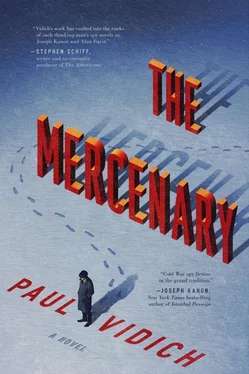“What do you want?” Garin asked, turning to Talinov, who guided him forward.
“Nothing that you can’t tell us,” Talinov said. “These men are from Posner’s branch. Counterintelligence. We want to talk about the girl, Natalya Alexieva.”
Garin shrugged. “Why are the lights in the hallway off?” They had moved through the door into a dank tunnel with mold that made Garin choke, but no sooner had he asked his question than Talinov waved his hand and the motion detector brought up the lights. Overhead bulbs hung at regular intervals down the vaulted underground passageway.
“We’ve grown too big,” Talinov said. “The First Directorate now has its own campus at Yasenevo. But Lefortovo still serves us. Crimes change, but we have the same guest rooms. This Annex was a wine cellar for the old tsarist mansion above us.”
Doors along the corridor had small barred windows, and Garin glanced at several, but saw only confining darkness inside. From somewhere came the steady drip of water.
Garin was led into a small suite of rooms illuminated by dim fluorescent lights. The anteroom had a wooden table, portable electric heater, old sofa, and coffee table, and along one wall, there was a kitchenette with stove and refrigerator. Glossy French pornographic magazines were scattered on the coffee table.
“For boredom,” Talinov said.
There was a second room with a single bed covered with a gray wool blanket and a white pillow, a small writing desk, and a high, barred window through which sunlight entered from the street.
“We will talk here,” Talinov said. “But first you will wait. There is coffee and biscuits.”
Garin found himself alone. He tried the door, confirming what he suspected. They had locked it from the outside. There was no pretense that he was anything other than a prisoner in the cell. He looked for a camera but saw none. He expected one, because he had fitted rooms like this, and he studied the ceiling molding, where one section had been cut out and replaced, but he found none there, and he didn’t find anywhere it was logical to hide a camera lens. But still, he behaved like a man who was aware he was being watched.
How long would it be? What did they know? He had gone through this once before. He knew what to expect, and that made him uncomfortable, but he knew he would have to be released in due course and delivered to the embassy. It was then that he contemplated the alternative. He went down the list of information he could give up to secure his release. Who would he betray?
Two hours passed. Garin’s head was slumped on the table when he heard the door open. The tall officer who entered was in his twenties, dressed in an olive uniform with red epaulettes, knotted tie, and a high-crown peaked hat with black plastic visor, which he removed and placed under his arm. He was trim and briskly polite.
“So, you’re the CIA guy,” he said in English. “I am Sergey Nikolayevich Rostov, Special Representative of the Military Collegium of the Supreme Court of the USSR. I am here to ask you questions. I understand that you speak Russian and I won’t have to use my rude English.”
“ Da .”
They proceeded in Russian. Rostov sat opposite Garin at the wooden table, placing his cap on his left and a leather portfolio on his right, promptly removing a white lined notepad. He took a ballpoint pen from his jacket pocket, laying it across the pad. He folded his hands and looked at Garin.
“Where shall we begin?” Rostov asked.
“I’m an American diplomat. Has the embassy been called? When do I get released?”
“I can’t answer that.”
“Why am I here? How about that?” Garin scowled. “Let’s start with something simple.” He didn’t try to hide his sarcasm.
“You are a witness to an administrative proceeding that is investigating allegations of crimes against the State by Dmitry Posner.” Rostov smiled briskly. “I am from the prosecutor’s office. Let’s begin, shall we? When did you meet Comrade Posner?”
“I don’t remember.”
“Was it at the American embassy, perhaps?”
“No. He wouldn’t be allowed in.”
“Spaso House, perhaps?” Rostov placed a pack of cigarettes on the table. “Smoke?”
“Yes, Spaso House.”
Garin stared at Rostov, evaluating the man’s generous expression, and he wondered if he’d ever distrusted anyone’s supposed friendship quite as much as he now doubted Rostov’s. He found himself being questioned about an internal Soviet matter, and yet it was obvious they thought he could be helpful, and being locked in the cell was anything but a joke. He sensed an opportunity.
“There was a party,” Garin said. “We were introduced. He was there, and so was half of the Presidium—and a few of your idiot KGB friends.”
Rostov looked up from his pad. “Sarcasm won’t make this go quicker. Do you understand?”
Garin leaned back. “I’m not going anywhere.”
“Do you know Natalya Alexieva?”
“She has nothing to do with this,” he said. “I met her at Spaso House. She was introduced as someone who could help me interview dissidents—anyone with a complaint.”
“Did you know she is Jewish?”
“Half Jewish. And so what?”
“Why were you at her home?”
“She refused to let me leave. She was afraid I would get lost, sleep on a stoop, and freeze to death.” Garin scoffed. “I don’t know what she thought. It was cold that night and I was drunk. I don’t trust her. Does she know I’m here?”
“My job is to ask questions, not to answer them.”
“How about one question?”
“Perhaps.”
“How long will I be here? The shorter my stay, the more likely I’ll cooperate.”
“I can’t answer that. I don’t know. Someone else will come later.”
“I am a consular officer held against my will. Understand? ” Garin shouted this across the table. “I demand to speak with my embassy.”
Rostov glared. “Yes, Mr. Garin, most of us don’t like to be questioned like this, and I’m sure someone will contact the embassy.”
Garin considered the flash of anger he’d seen in Rostov’s eyes, and he understood that Rostov was a cog, and he found it hard to despise a weak man who was following orders.
There were more questions that Garin answered with a minimum of dissembling in order to keep the interview moving along. He answered truthfully where he could, sometimes obliquely, but never with a lie that could be proved, and in the process, he tried to discern the nature of the investigation from Rostov’s questions. Rostov wrote down Garin’s answers dutifully in his cramped, precise script, and Garin noted what piqued the prosecutor’s interest. When Rostov’s questions were too pointed, he replied vaguely and evasively. He wasn’t going to sacrifice a piece in the game without a deal in hand. He gave Rostov nothing concrete, but even so he contradicted himself several times, and when Rostov pointed that out, Garin equivocated by saying, “I can’t remember!” After an hour of frustrated questioning, Rostov walked out.
* * *
“WAKE UP.”
Garin had fallen asleep in the chair, and his head lay on the table. His leg had gone numb, and he felt the dead appendage’s nerve endings waking with the excruciating pain of needles. He rubbed the leg and lifted his head to the man who’d spoken his name.
The man was dressed in civilian clothes, but his expression was military and menacing. He opened the locked second door.
“In here.”
Garin resisted, but the man grabbed his shirt and shoved him belligerently, causing him to stumble. There was no window and one lightbulb on the ceiling. It was an interrogation room. Hooked chains hung from one wall, and metal rods lay on the floor by a foul-smelling, rusted drain. Garin was hit on the thigh by the man’s plastic baton, and he crumpled to one knee, screaming in agony.
Читать дальше












